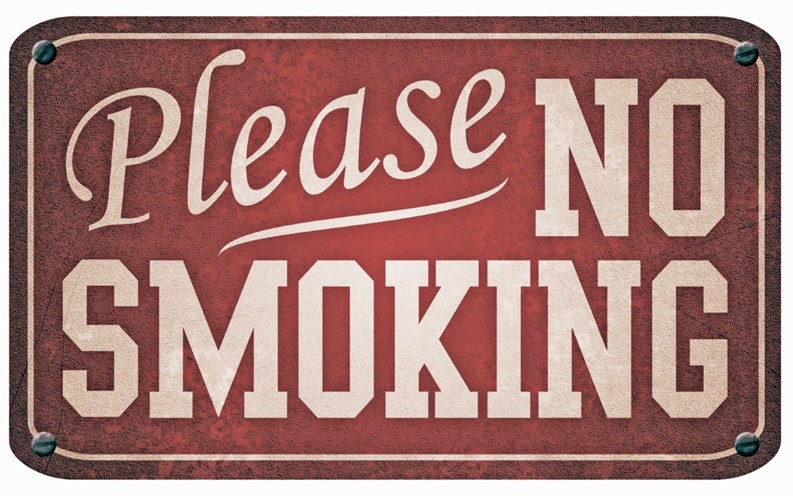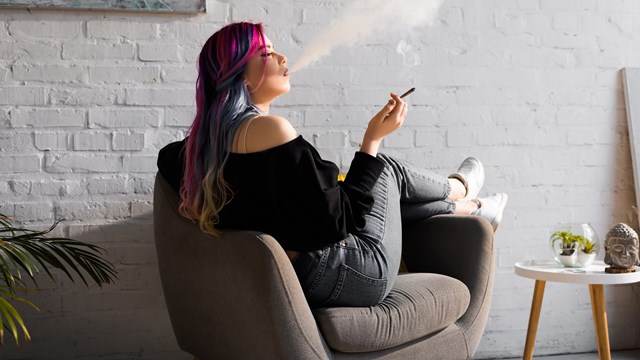The late 1990s saw a surge of nationwide smoking restrictions put into effect. With varying amounts of resistance and controversy, workplaces, shops, theaters, restaurants and bars in a growing number of states—including New Jersey—all went smoke-free.
More recently, as the tide of public and medical opinion has turned more decisively against smoking, developers and administrators in a few buildings across the Hudson in New York City have attempted to ban smoking not just in common areas, but in private apartments as well.
No New Jersey condos have attempted to follow suit, but most industry experts agree that it's only a matter of time before the first Garden State condo attempts to go smoke-free. When that day comes, questions will inevitably arise: Is it morally right to impose restrictions on neighbors’ private residences? How will such decisions impact the building community’s cohesiveness? How will placing such restrictions on private units affect their resale value? And perhaps most important, is banning smoking in private apartments even legal?
New Jersey passed its own Smoke-Free Air Act in April 2006. Its provisions stated that smoking is a “leading cause of preventable disease and death in the state and the nation,” and that “smoking is prohibited in an indoor public place or workplace.” Exempted from the law are private homes and automobiles as well as cigar bars, cigar lounges, tobacco retail establishments, tobacco businesses and casinos under certain conditions. Anyone who is in violation of the law could be fined from $250 to $1,000 depending on the frequency of the offense.
The New Jersey law also stated that indoor public spaces and workplaces are required to put up visible signs that say that smoking is prohibited and that violators are subject to a fine. Conversely, the person in charge of the public spaces or workplaces may put up a “Smoking Permitted” sign in specific areas where smoking is allowed.
A smoking ban has recently been proposed to cover New Jersey's beaches. Earlier this year, the Asbury Park Pressreported that the state Senate's Heath, Human Services and Senior Citizens committee were considering banning smoking on all of the state's public beaches.
Is It Legal?
Most boards and associations aren't entirely clear what their rights and limitations are when it comes to restricting smoking within their building. Confusion often arises, because while most state statutes give boards virtually free rein to regulate their own common areas, they have far less latitude to infringe upon or place restrictions on private units.
"There are a lot of residential rental landlords in New York who have started to ban smoking in their buildings," says Eva Talel, an attorney with the Manhattan-based law firm of Stroock & Stroock & Lavan LLP. And it would be much easier to enforce, says Talel, if such a ban were adopted by shareholder/owner action rather than just by board action. A majority vote, which is defined by a building’s bylaws and differs from community to community, would be needed to pass an owner-initiated smoking ban amendment.
According to attorney David Byrne of the Lawrenceville-based law firm of Stark & Stark, enforcement is more the issue than a board's ability to enact a rule. "If someone came to me and said, 'We want to ban smoking inside people's units,' I'd say I think you can do it—but I'm not sure how you're going to enforce it. Are you planning on doing random smell checks on other people's doors? Are you going to include in a resolution the right of condominiums to change the locks and knock the door down to see if [a resident] has dirty ashtrays?
“One of the things I've really focused on in the last several years is on clients not having rules that they have no ability or intention to enforce. Otherwise, it's kind of like a show—it's a game. It's not real, and it undercuts their ultimate authority and credibility for other issues."
“It can be an easy process,” counters Christopher Banthin, director and senior staff attorney for the non-profit Public Health Advocacy Institute (PHAI). “The reason that it is easy is due in part because the law bows and favors the community wishes.” A 2008 survey conducted by PHAI of selected metropolitan areas in the Northeast found that 16.7 percent of condominiums in those areas had banned smoking everywhere in the condo, including inside units. Most of the bans, notes Banthin, occurred in smaller buildings where majority votes for bans tend to run into little opposition.
“I don't think there is any legal impediment to doing it as long as it is properly disclosed,” agrees David Larkin, National Director of Community Associations for the development firm Toll Brothers. To stay on the right side of the law however, Larkin advises that “Condos should always talk to their legal counsel. A board that is considering a bold move [like a smoking ban] has a fiduciary obligation to get a complete legal analysis of their specific situation before they take any action. That's Step One. Step Two is talking to the Department of Community Affairs (DCA) for some guidance. They may not have full jurisdiction, but they would certainly weigh in. Three, the board has to make sure that going smoke-free is what their people really want.”
Byrne is doubtful that the legal process would take it that far but courts tend to give a pretty wide latitude to HOAs to determine their own governance.
“If you created a condominium by virtue of the master deed, which prohibits smoking in units, then that's a restricted covenant, which is more enforceable than a board resolution banning smoking inside units. There's a difference in how the courts interpret and enforce those two different things,” Byrne says.
Smokers' rights advocate Stephen Helfer says smoking bans can open a legal Pandora’s box for boards. “This issue opens a whole host of problems for associations,” he says. “If bans are placed on owners for smoking, what about the individual who has pet allergies, or chemical sensitivities? It empowers everyone to put up a fight against any second-hand scent.”
Is it Economically Sound?
Fear of lawsuits and the possibility of plummeting resale values also makes many boards hesitant to move forward with smoking bans.
The latter concern may be unfounded however, if a 2008 study conducted by the PHAI is any indication. In the survey, fully 81 percent of 1,300 prospective apartment buyers polled were immediately less interested in an condo unit if they smelled tobacco smoke when viewing the property. The study also found that 69 percent of those interviewed were interested in knowing upfront if a property listing was in a smoke-free building. Surprisingly, 43 percent of the individuals surveyed were willing to pay more to live in a smoke-free building.
Talel has seen similar trends. “That's always a question that comes up—is doing this going to result in a diminution of values in the building?” she says. “I think developers have a real opportunity to put the fact that a building is non-smoking into their into their offering plan and constitutional documents. It's just like we're beginning to see offering plans for buildings that are going to be green, or LEED-certified, or both. There's a lot of legitimacy for it from a marketing standpoint. The statistics suggest that there might actually be a demand for smoke-free housing, and [that gives us] good reason to think that it would enhance not only residents' health but the value of their apartments.”
“Virtually every survey done has shown that there has been a positive or neutral effect when an apartment or condominium has gone smoke-free,” says Jim Bergman, attorney and director of the Smoke-Free Environments Law Project located in Ann Arbor, Michigan. “No research has shown a negative impact." However, Bergman notes that “condos are much slower across the board and across the country. Owners are still afraid that making this change will negatively impact resale value.”
Speaking of money, the cost of rehabbing a smoker's apartment to make it ready to sell can be significant. “It can run from $500 to $8,000—even as high as $10,000 to rehab after a smoker,” says Bergman. Costs can include floor-to-ceiling washing and painting of the walls, fan removal and removal of carpet.
Is it Ethical?
When it comes to smoking bans, it seems that there isn't much middle ground—either people are for them or against them. Clearly, smokers themselves are the most vocal objectors to smoking bans, but regardless of whether you smoke or not, most people would agree that their home is their private sanctuary. No one wants to be told what they can and can’t do in the privacy of their own four walls.
But as Banthin points out, “A smoker’s rights stop at their neighbor’s nose. Once actions adversely affect someone, there is an issue.” Bergman agrees, adding, “I have the right to swing my arms back and forth, but when I make contact with someone, my right to do that ends. It is an ethical issue. Do I morally have a right to inflict health problems on my neighbor?”
Helfer, on the other hand, believes that discussions on smoking restrictions in condominiums are merely the next step in the anti-smoking movement’s agenda, a movement that has only built over time and become extremely powerful. Helfer believes that not only is it improper to place smoking restrictions on private homes, but also points to the dehumanizing aspect smoking bans place on the community itself.
Perhaps not surprisingly, Banthin and Bergman disagree. “I understand the argument, but it does not hold up,” says Bergman. “No one is saying, ‘Stop smoking.’ We are saying, ‘Smoke somewhere else.’”
“I think the other aspect that we all have to remember is that smokers are not considered to be a constitutionally protected class,” says Talel. “There's no constitutional right to smoke. So, no a smoking ban obviously isn't going to be unconstitutional. Further, I think the courts have held that not only isn't there a constitutional right to smoke, but that smoking isn't considered a handicap or disability. So, a smoking ban would not be considered discriminatory against smokers. I think we feel reasonably comfortable with that aspect of it.”
Larkin agrees. “It's not banning somebody on the basis of gender or national origin or something.” Considering that only about 15 to 20 percent of the adult U.S. population smoke, this leaves the vast majority of the population non-smokers. It is no surprise that smoking bans are moving closer and closer to home. “With 80 percent of the population not smoking, I can imagine that the inventory of smoke-free buildings moves towards that number and then will eventually level off,” predicts Banthin.
As time goes on, "I think that more and more people are going to be complaining about smoke," adds Byrne. "My evidence is anecdotal, but now you can hardly smoke anywhere—and that means that I find that cigarette smoke more noticeable now when I smell it because I'm so not used to it. So I think the trend is for people to press to be more free from cigarette smoke. But at the same time, I don't think courts are any more sympathetic to a condominium's right in New Jersey to limit the conduct of people inside their homes. I deal with judges all the time, and for the most part they're very skeptical of condominiums and their attempts to do things. I think that is a potential issue."
And Larkin sees a future not peering through a haze of cigarette smoke. “I think society is heading towards more and more cases of banning smoking,” he says, “and I think that in the next five or 10 years, you're going to see more smoke-free buildings.”
Legally, economically and ethically, buildings and residents will need to explore whether smoking bans will fit the needs and landscape of their own unique community. In the end it is the community as a whole that has the right to place, or reject, smoking restrictions.
Hillary Pember is a Massachusetts-based freelance writer and a frequent contributor to The New Jersey Cooperator.







11 Comments
Leave a Comment